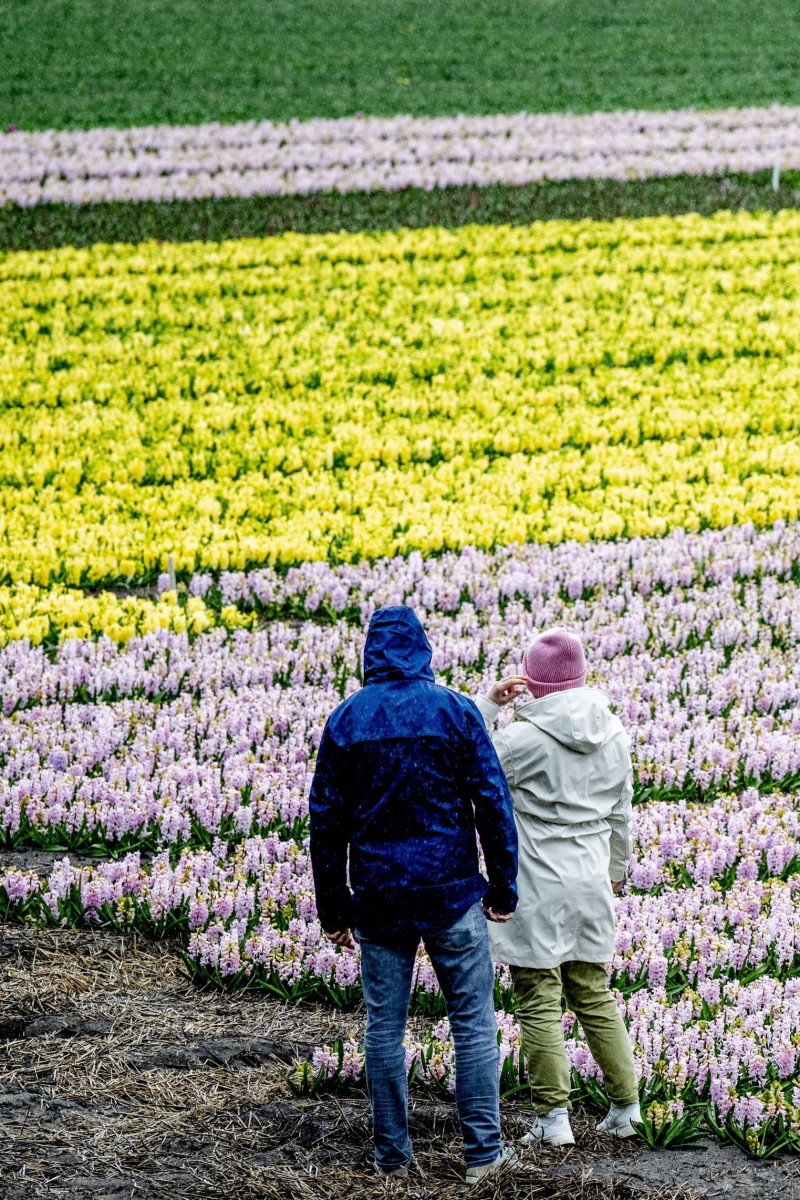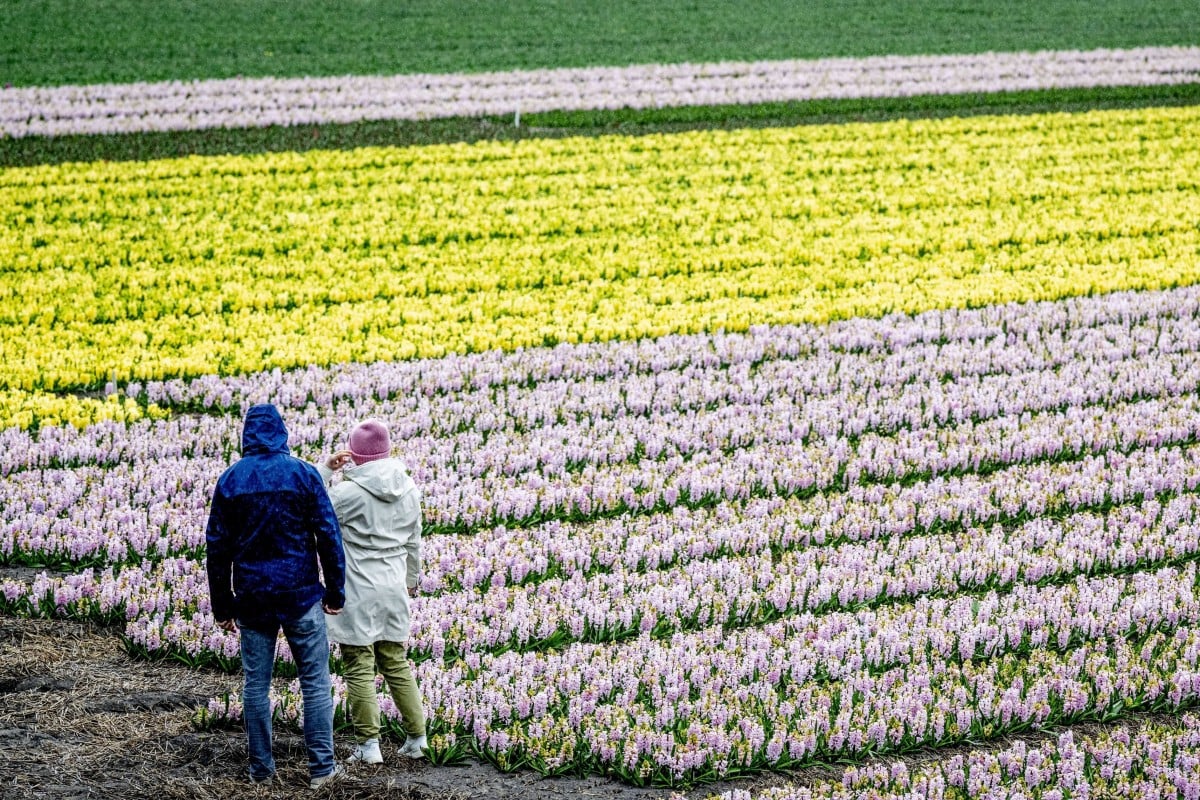
5-minute listening: Netherland’s Keukenhof park – world’s largest tulip garden – launches its 75th edition
- Keukenhof park is southwest of Amsterdam and it contains millions of tulips of every colour and other flowers across 32 hectares
- Practise your English with our short listening exercises: play the audio; answer the questions; and check the answers at the bottom of the page.
 Keukenhof, the world’s biggest tulip garden, opened to the public for its 75th edition. Photo: EPA-EFE
Keukenhof, the world’s biggest tulip garden, opened to the public for its 75th edition. Photo: EPA-EFEQuestions
1. Where is Keukenhof park located?
A. Germany
B. Amsterdam
C. Belgium
D. France
2. Which word can replace “bulbs” in the podcast?
A. paintings
B. gardens
C. people
D. flowers
3. When was Keukenhof park first opened?
A. 1909
B. 1919
C. 1949
D. 1994
4. How long is Keukenhof park opened every year?
A. only one week
B. about two months
C. half a year
D. It is open throughout the year.
5. What is Keukenhof park famous for?
A. It is one of the most photographed places in the world.
B. It has the largest collection of flower paintings in Europe.
C. One of the Dutch kings used to live in the garden.
D. More than 10 million people visit the garden every year.
6. What else can visitors do at the park?
A. visit a petting zoo
B. go on a boat tour
C. look at artwork
D. all of the above
7. If something is the “highlight” of a show, it …
A. is the most important part of it.
B. is only popular with a certain group of people.
C. takes place once every 10 years.
D. takes a lot of time to organise.
8. What is the golden yellow tulip named after?
A. an opera singer
B. a country
C. a king
D. an extinct animal
9. Why did some people protest outside the garden’s entrance gates?
A. because of the amount of waste the exhibition creates
B. because of the use of pesticides to grow the flowers
C. because of the greenhouse gas emissions generated by the park
D. information not given
10. What were the protesters wearing?
A. green suits
B. bee costumes
C. uniforms
D. nothing
11. Complete the following summary about Keukenhof park using information from the podcast.
Keukenhof park is the world’s biggest (i) _____ garden. The park spans across (ii) _____and features million of tulips as well as other flowers. This year’s highlights include a King Charles III tulip and a performance by an (iii) _____. Even though the opening of this year’s event saw a (iv) _____against the use of pesticides, most visitors said they enjoyed the flowers. The park will be closed to the public on (v) _____.
Answers
1. B
2. D
3. C
4. B
5. A
6. D
7. A
8. C
9. B
10. D
11. (i) tulip; (ii) 32 hectares; (iii) opera singer; (iv) protest; (v) May 12
Script
Adapted from Agence-France Presse
Voice 1: The world’s biggest tulip garden opened to the public last month for its 75th edition, with hundreds of thousands expected to enjoy a bewildering array of seven million bulbs in the western Dutch city of Lisse. Keukenhof park is southwest of Amsterdam in the heart of “bulb country”, and it contains millions of tulips of every colour and other flowers across 32 hectares.
Voice 2: The park is a popular tourist attraction: last year, 1.4 million people visited. It also claims to be one of the most photographed spots in the world. Keukenhof dates back to 1949 when a group of bulb exporters and growers inaugurated it as a showcase for their wares. Every year, it opens its gates to visitors from mid-March to mid-May.
Voice 1: In addition to tourists from more than 100 countries, it has proved a draw for royalty, with kings and queens from several European nations attending the gala opening over the years. In addition to the flower displays, Keukenhof features art exhibitions, boat tours through the surrounding flower fields, and even a petting zoo for children.
Voice 2: One of the show’s many highlights this year includes a golden yellow tulip named after Britain’s King Charles III. The gala opening will also have a musical extravaganza to celebrate 75 years of Keukenhof featuring Dutch opera singer Laetitia Gerards.
Voice 1: The opening was also not without some controversy. Outside the entrance gates, seven naked protesters of the climate group Extinction Rebellion briefly protested against pesticide use in the bulb-growing industry. According to the group’s spokeswoman, Lydia Steutel, insects, birds, and plants have died because of the agricultural poisons used to cultivate the flowers. Most visitors, however, said they were just enjoying the outdoor flower garden. The park is open this year until May 12.
